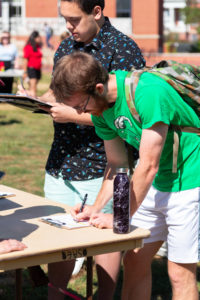When voters from across Virginia voice their opinions at the polls tomorrow, UMW students will be among them. That’s thanks in part to rides being offered all day to students who wish to cast ballots.

“Civic engagement isn’t just an idea at Mary Washington,” said Sarah Dewees, Associate Director of the Center for Community Engagement (CCE), which will provide rides, along with UMW Votes, Citizens for Democracy and other campus groups. “It’s a way of life.”
With a voting rate higher than the national average – and lots of planning and energy – UMW students have worked all year to keep it that way, from prepping voters for trips to the polls to establishing a “2020 Day on Democracy,” allowing classes to be cancelled on Election Day next year.
“When individuals miss their opportunity to vote, they miss their chance to have their voices heard,” said UMW Voting Ambassador Kayli Ottomanelli, a junior who cited issues that matter to undergrads, like tuition rates and student loan debt. “When younger generations don’t turn out to vote, we’re allowing older generations to decide on these significant matters for us.”
Sixty-seven percent of UMW students showed up at the polls in 2016, according to the National Study of Student Learning, Voting and Engagement (NSLVE). That’s higher than that year’s national average of 61.4 percent reported by the U.S. Census. The student voter registration rate (86.7 percent) and voting rate of registered students (76.8 percent) at Mary Washington also exceeded the 2016 national average. Though turnout is typically lower in years without national elections, voter engagement among UMW students stayed strong at 53 percent in 2018, according to the NSLVE report.
“If you look at [the] data, it’s clear that our small school has something special,” said Ashley Utz, a senior and member of Citizens for Democracy. “Our voting rates are competitive with those of Ivy Leagues. What we lack in size …, we clearly make up for in passion and engagement.
Indeed. Mary Washington students spent the year enhancing a culture that supports participation in elections and civic life. This spring, a group of them, including Utz, who will graduate in December, worked with alumni, faculty and administration to design and propose a “2020 Day on Democracy.” Passed by the University Faculty Council in March, the plan will free students’ time to turn out to the polls during the next national election.
“We look forward to working with students to make the Day on Democracy a success,” said Dewees, who pointed to necessary preliminary efforts, including working to register, educate and engage voters.
In September, a group of student organizations celebrated National Voter Registration Day, setting up registration stations, information booths and visits from local candidates. More than 200 students attended the event, Dewees said, and 45 students were registered to vote.
This fall, the James Farmer Multicultural Center and the Center for Leadership and Media Studies – in participation with the College Republicans, Young Democrats and Student Government Association– brought a host of political candidates and elected officials to campus for debates and public lectures. And the CCE enrolled UMW in the All In Campus Challenge, a program to help students form the habits of active and informed citizenship and make democratic participation a core value on campus.
“Students actually have more voting power than they may know,” said UMW Voting Ambassador Stephanie Turcios, a junior. “In the end, you have no reason to complain about certain issue if you did not vote.”





